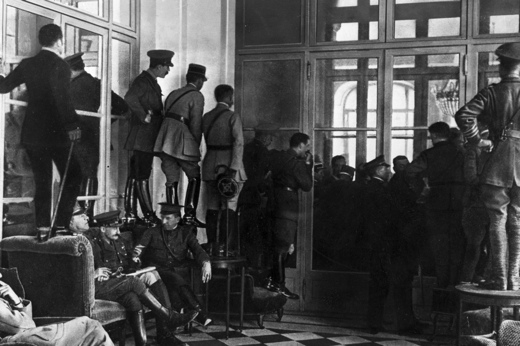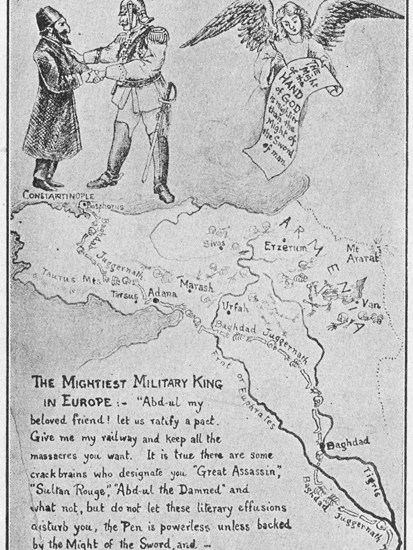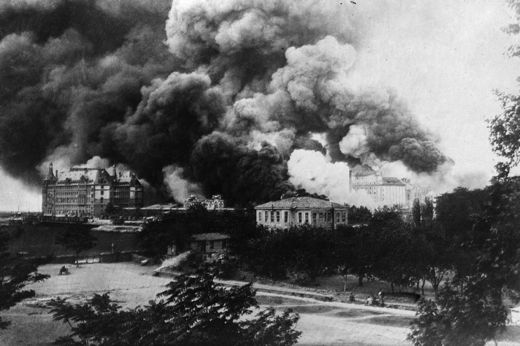The European statesmen who went to war in 1914 were extremely well-educated men. Churchill staggered Roosevelt as he could quote reams of quite obscure poetry; the secretary of state for war translated German philosophy; the French president’s brother was a revered mathematician; General von Hindenburg read Faust on campaign (even Corporal Hitler had his Schopenhauer). The only exceptions were probably the aristocrats of the Vienna cabinet, whose definition of scholarship was that it was what one Jew copied down from another. But that world gave us 1914, and a whole set of amazingly bad judgments. No war in modern times has been launched with such a vast failure of cognition.
The war would be short, said the bankers and economists, because you could not interrupt trade and you could not finance things with paper; the middle classes would go on strike if you put up income tax to 15p. The Germans would collapse, said British planners of blockade, because they could not survive the loss of exports. Cavalry would sweep all before it, said some generals; but might be stopped by great fortresses, said other generals. Great battleships would collide in the North Sea, said the admirals. These things were not just mistakes; they were hallucinations. Cavalry charges could not happen against modern rifles. Fortresses were an obvious target for high explosive, whereas trenches were not. German exporters, forced into other activities, went into war work and derived explosives from nitrogen in the air by the Haber-Bosch process. People accepted paper money, and uncomplainingly paid taxes of 40 per cent on their incomes.
The German battleships spent all but a day or two in harbour, and the sailors, when finally ordered out to sea at the very end, as a last sacrifice, mutinied and overthrew the Kaiser. This ‘war to end war’, as they billed it, was a disaster in itself, but it caused more disasters: fascism, communism and, through the non-resolution of financial problems, the world economic collapse of the 1930s.
Could it happen again? Ingenious efforts are made to draw parallels between that world and this. There are some obvious beginnings. The Pax Americana is clearly not what it was, and the same had been true of the Pax Britannica of the 19th century.
There is a fast-rising power, China, to match the fast-rising Russia of 1914. There is a very turbulent region, the Middle East, to match the Balkans of 1914, out of which the first world war grew. The Balkans were a strategic area, a jumping-off point for the Middle East, which was then the Ottoman or Turkish empire, where oil had already become important. Balkan states were intensely nationalist, and each had its foreign patron. Nowadays, if Israel invoked the American alliance and attacked Iran, which in turn invoked a Russian or even Chinese alliance, no one would be very surprised.
The broader parallels were explored by Martin Hutchinson, in the Asia Times last month, who made the point that in 1914 protectionism and trade blocks were on the rise, and that international instability came from the number of states involved in potentially dangerous roles. Come a world financial crisis, then what?
None of these speculations really works. The world economy was flourishing in 1914, with trade and investment at record levels. Hutchinson would have been nearer the mark had he used 1939 and the second world war as a comparison, for then, rival trading blocks were indeed a factor, and enlightened Anglo-Americans met at Bretton Woods in 1944 to make sure it did not happen again. In 1914, there were indeed rival alliances, but they had no commercial content until the war enforced something of the sort.
There were four ‘great powers’ in Europe, none of them matching the predominance of the USA today. It is not conceivable that the US would launch a preventive war to stop China from emerging as a rival, whereas in 1914 a main motive for Germany was to stop Russia. (‘She grows and grows, and weighs on us like a nightmare,’ said Chancellor Bethmann Hollweg.) And we are not now so misguided about war as we were in 1914. Lloyd George famously stated that we had all somehow stumbled into war; no doubt it could happen again if we were not careful. However, the central feature of the world between 1890 and 1945: the Germans went ape. Before and after, they were and have been largely admirable. But there is that horrible hiatus, between the non-renewal of the Russian treaty and the final scenes of the film Downfall, with the Russians closing in on Hitler’s bunker. Curiously enough, Theobald von Bethmann Hollweg had a premonition. His son asked him whether he should plant elms at Hohenfinow, the family estate in Brandenburg. He answered, no, they would grow slowly, and in 30 years the Russians will be here (to the day, almost, that happened, and Hohenfinow went up in flames).
After 1890 the Russians took up a well-paying French alliance, and Germany faced a two-front war. One solution, adopted in 1897, was to knock out France by invading her through neutral Belgium. Then, to make matters much worse, the Germans announced plans for a great battle-fleet, designed to fight the Royal Navy in the North Sea. This started an arms race with Great Britain. It also meant much less money for the two-front army, and hence loss of the campaign of 1914. By 1914 the military leaders were obsessed by the rise of Russia, and wanted an attack on her before, by 1917 and the acceleration of Russian mobilisation plans, it was too late. Berlin used a Balkan terrorist episode as an excuse to challenge Russia, and when she mobilised, the atmosphere in the Prussian war ministry was of utter glee.
By then, just about the only sane men in Germany were the Kaiser, who tried too late to stop the machine, and Professor Dr Max Weber, who volunteered as a stretcher–bearer for the Red Cross. The men behind these decisions destroyed their papers when it all ended in disaster, but we can reconstitute their thinking from bits and pieces that were forgotten about (Max Hastings gives a useful list of these in his recent Catastrophe).
This frenzy of overconfidence went on into the first world war, when the US was provoked; ,and at its end, Germany was at war with almost the whole world. The same thing happened on a vast scale 30 years later, and when Hitler held his last birthday celebrations on 20 April 1945, only a bedraggled little cohort of excellencies from an assortment of clerico-fascist states (including Ireland) picked its way from the Kaiserhof Hotel through the rubble to present their congratulations. Why Europe’s leading civilisation found itself in this condition is a mystery, but there we are. There is nothing comparable in the modern world. The parlour-game parallels of 1914 and today remain just that.
But there is one parallel which can be drawn; a continuity that goes on and wearily on. The greatest hallucination of all in 1914 was the common war aim: empire. In 1919, the British and French were supremely confident as to its importance. They added great swaths of land to their already vast possessions (as the Germans would have done at Russia’s expense, and as the Italians would have done had anyone let them). Empires were supposed to make you rich, and you could export your surplus population to them, there to exploit the natives and supply cheap raw materials for the metropolis while also forming a captured market. In 1914, the last great theatre for imperial operations lay in the Middle East, where the Ottoman Empire seemed to be on the verge of dissolution — and, therefore, up for grabs.
In December 1913, at Sirkeci station in Constantinople, the German general Liman von Sanders arrived, on the Orient Express, with 70 officers. It was a military mission, and it was to take over the training and even command of the Turkish army. Germans were already constructing the artery railway of Anatolia, and the Russians took alarm: their trade could be brought to a standstill, their Caucasus forces could be at the mercy of a sudden attack. The first direct German-Russian clash then took place, ending in an uneasy compromise. The Balkans, over which the Great War broke out a few weeks later, really mattered because they were on the way to Constantinople, and the great prize of Middle Eastern empire. The Germans did not conceal what they had in mind. Turkey, they said, was to be ‘our Egypt’.
There will not be many takers these days for the Nile cruise-ships, but if you are there, ponder on the Aswan Dam. Not the vast and ugly Soviet-built one, but a smaller, elegant one, built by the British in 1898. The consul-general (meaning imperial governor: one of the British strengths is the under-stated title) Lord Cromer could take much pride in it. It was an engineering triumph, a symbol of the transformation that the British had worked in a quarter-century in Egypt: planned towns, drains, ordered finance, justice for the peasant. Germans (their archaeologists were spies) were hugely envious. In the first world war, they were busy fomenting a holy war to drive the British out — the idea was to inspire an Islamist insurgency, to destabilise the British. This is the plotline of John Buchan’s novel Greenmantle, and of Sean McMeekin’s recent book about the Berlin-Baghdad railway — seen, then, as an artery along which the blood of a new and mighty German empire would flow.
Britain was not too worried about Islamism. Its empire in India had been set up on the ruins of another Islamic empire, that of the Mughals (also originally Turkish). The British plan was to destabilise the Ottoman empire by promoting Arab nationalism, and a situation where the authority of the British viceroy in India would be reinforced by a caliph — the candidate being the then ruler of Mecca, Hussein, to whom £5 million in gold was given (largely disbursed among tribesmen who then defected). The Ottoman sultans had usurped the Caliphate when they took Egypt in 1517, and the British thought that they would be popular if they restored it, with a pliant figure.
They encouraged the Arab revolt against the Turks, and Lawrence of Arabia had a field day. All of this turned out to be fantasy (subject of a famous film, à la Braveheart, that is historical hokum). In fact, very few Arab officers deserted — vastly more fought for the Turks in their postwar fight for independence. The other great obstacle to British pan-Arabism was that the French, their war-time allies, had to be given some concession. They were already well and truly present in Lebanon, and they had ambitions for Syria as well.
The French fancied they had a special understanding of Islam (it is true that French Orientalists were superb, though in the case of Louis Massignon almost ludicrously unstable) and their great showcase piece was Morocco, their Egypt. With the Sykes-Picot agreement of 1916, they got Syria, to which was attached Mosul, in northern Iraq. Two states then emerged, which have been trouble ever since. The French carved their new and distinctly artificial possession into separate parts; Syria was made out of Christian, Druze, orthodox Islamic and heterodox Islamic (the Alawites, cognate with the Shias in Iran). The present civil war in Syria is a hideous continuation, and it may end in a replica of the French arrangements of 1920.

Allied officers peer into the Hall of Mirrors as the Treaty of Versailles is signed (Photo: Henry Guttmann/Getty)
The British still had ambitions for Hussein, and wanted to install his family somewhere in the Arab world. They settled on Iraq. That country was spatchcocked together as a kingdom, with three very different sections: orthodox Sunni Muslim, the dominant element, though a minority, under the Ottoman Turks; Shia Muslims, whom most people regarded as quite impervious to science and progress; and Kurds, a largely nomadic tribal people. The subsequent history of Iraq, as of Syria, has been calamitous.
In 1919, at the Treaty of Versailles, the Allies put in a war-guilt clause in which they rightly stated that the German government had caused the war, and quite wrongly added that ‘the Germans’ should pay sums of money that were meant to ruin them for two generations. This had much to do with the outbreak of the second world war, and a French general remarked, accurately, that Versailles marked ‘an armistice of 20 years’. But the boundaries set up in the Middle East after the first world war remain with us, a source of endless problems. It is maybe ironic that the only country then set up which remains stable and liveable-in is Turkey, the one that was supposed to be abolished.
Someone should come up with a ‘peace-guilt clause’, and this time round we can blame the British and French — not the Germans.
Got something to add? Join the discussion and comment below.
Get 10 issues for just $10
Subscribe to The Spectator Australia today for the next 10 magazine issues, plus full online access, for just $10.
You might disagree with half of it, but you’ll enjoy reading all of it. Try your first month for free, then just $2 a week for the remainder of your first year.















Comments
Don't miss out
Join the conversation with other Spectator Australia readers. Subscribe to leave a comment.
SUBSCRIBEAlready a subscriber? Log in